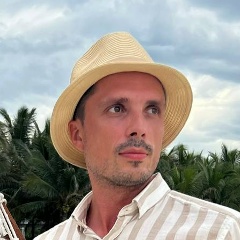Так сложилось, что практически подряд прочитал "Сто лет одиночество" Маркеса и "Педагогическую поэму" Макаренко. Очень контрастное и звонкое получилось сочетание - скорбь отчуждения от людей и гимн коллективу.
Маркес читается как заунывная тягомотина, едва ли от непрерывного наблюдения за всеми болями героев можно получать удовольствие - хотя в целом и оставляет на душе ту самую тоску, которая заставляет взглянуть и на себя, и на окружающий мир, и несет некоторую долю назидательности.
Напротив же, Макаренко вызвал искренний, почти детский восторг, и даже какую-то человеческую зависть тому, чего у меня вот лично никогда не было. Мысль о том, что именно к его воспитанникам применима фраза "гвозди бы делать из этим людей", приходит неотвратимо, тем более что сам он не стесняясь в своих мыслях называл их, еще только пришедших в колонию, "рудой". Кто читал Стругацких и говорил себе: "Ну, это всё хорошо, но мы эту возможность упустили, нет таких людей"? А человек занимался именно таким производством, один в один, даже организация похожа с книгами (где там упоминались Учителя в Мире полудня), еще в 1922 году. И тем ироничнее и трагичнее выглядит конец его истории - "не социалистический метод, детский труд запрещен, казарму тут устроили".
В общем, очень живой отклик в душе моей нашла эта книга, и вообще я снова задумался о том, как в мире появляются Люди, счастливые и волевые. Да, с Макаренко нельзя поспорить, что "поле, предоставленное само себе, зарастет только сорняками и бурьяном". И конечно тут бывают удачные исключения, создающие себя сами вопреки всем обстоятельствам, но это речь о тех, кому не так повезло. Человеческая жизнь и развитие личности строятся на страдании и преодолении. Современная педагогика, заботливо оберегающая детей от малейших испытаний, часто с водой выплескивает и ребёнка, и встает на те же грабли, что и родители, содержащие ребенка в абсолютной стерильности и доводящие иммунную систему до аллергии. Глупо надеяться, что результатом выхода в большой и опасный внешний мир станет новый Будда.
У неё, конечно, есть основания - слишком уж просто прогнуть прогнуть юную личность запретами и наказанием, и даже совершенно внешне невинными действиями, ставящими перед маленькими детьми неразрешимые дилеммы (тут можно обратиться к богатому опыту психотерапии личности). И понятен отказ от коллективного - настолько же просто растворить личность в толпе, если личность лишена внутреннего стержня. "Бегство от свободы" Фромма, конечно, больше отвечает на вопрос о том, почему люди с удовольствием покоряются авторитарным режимам и требуют сильной руки, но в целом описывает трагедию всех людей, не способных уже услышать свое собственное Я.
Я могу вспомнить, каким важным событием для меня был переезд из родительского дома, довольно поздно, кажется в 22 года, когда довелось вырваться из под гиперопеки. Как простые бытовые вопросы открылись для меня с новой стороны, чего стоила возможность самому организовать свою жизнь, и как меня это толкнуло вперед. И сколько раз после этого именно вызовы и сложности заставляли чувствовать себя свободнее и взрослее. Но меж тем к своим 27 по самоощущению дорос только лет до 19 - уже могу реально смотреть на вещи, но идеализм и глупые несдержанные эмоции все еще заставляют меня делать глупости.
Где-то там, наверное, есть "философский камень" человеческого Я, но на него рассчитывать не приходится. Пока же очень хотелось бы понять, может ли человек вырасти счастливым, не страдая?
И почитаю что-нибудь современное про воспитание, хочется понять, как разрешают этот конфликт современные подходы.
Маркес читается как заунывная тягомотина, едва ли от непрерывного наблюдения за всеми болями героев можно получать удовольствие - хотя в целом и оставляет на душе ту самую тоску, которая заставляет взглянуть и на себя, и на окружающий мир, и несет некоторую долю назидательности.
Напротив же, Макаренко вызвал искренний, почти детский восторг, и даже какую-то человеческую зависть тому, чего у меня вот лично никогда не было. Мысль о том, что именно к его воспитанникам применима фраза "гвозди бы делать из этим людей", приходит неотвратимо, тем более что сам он не стесняясь в своих мыслях называл их, еще только пришедших в колонию, "рудой". Кто читал Стругацких и говорил себе: "Ну, это всё хорошо, но мы эту возможность упустили, нет таких людей"? А человек занимался именно таким производством, один в один, даже организация похожа с книгами (где там упоминались Учителя в Мире полудня), еще в 1922 году. И тем ироничнее и трагичнее выглядит конец его истории - "не социалистический метод, детский труд запрещен, казарму тут устроили".
В общем, очень живой отклик в душе моей нашла эта книга, и вообще я снова задумался о том, как в мире появляются Люди, счастливые и волевые. Да, с Макаренко нельзя поспорить, что "поле, предоставленное само себе, зарастет только сорняками и бурьяном". И конечно тут бывают удачные исключения, создающие себя сами вопреки всем обстоятельствам, но это речь о тех, кому не так повезло. Человеческая жизнь и развитие личности строятся на страдании и преодолении. Современная педагогика, заботливо оберегающая детей от малейших испытаний, часто с водой выплескивает и ребёнка, и встает на те же грабли, что и родители, содержащие ребенка в абсолютной стерильности и доводящие иммунную систему до аллергии. Глупо надеяться, что результатом выхода в большой и опасный внешний мир станет новый Будда.
У неё, конечно, есть основания - слишком уж просто прогнуть прогнуть юную личность запретами и наказанием, и даже совершенно внешне невинными действиями, ставящими перед маленькими детьми неразрешимые дилеммы (тут можно обратиться к богатому опыту психотерапии личности). И понятен отказ от коллективного - настолько же просто растворить личность в толпе, если личность лишена внутреннего стержня. "Бегство от свободы" Фромма, конечно, больше отвечает на вопрос о том, почему люди с удовольствием покоряются авторитарным режимам и требуют сильной руки, но в целом описывает трагедию всех людей, не способных уже услышать свое собственное Я.
Я могу вспомнить, каким важным событием для меня был переезд из родительского дома, довольно поздно, кажется в 22 года, когда довелось вырваться из под гиперопеки. Как простые бытовые вопросы открылись для меня с новой стороны, чего стоила возможность самому организовать свою жизнь, и как меня это толкнуло вперед. И сколько раз после этого именно вызовы и сложности заставляли чувствовать себя свободнее и взрослее. Но меж тем к своим 27 по самоощущению дорос только лет до 19 - уже могу реально смотреть на вещи, но идеализм и глупые несдержанные эмоции все еще заставляют меня делать глупости.
Где-то там, наверное, есть "философский камень" человеческого Я, но на него рассчитывать не приходится. Пока же очень хотелось бы понять, может ли человек вырасти счастливым, не страдая?
И почитаю что-нибудь современное про воспитание, хочется понять, как разрешают этот конфликт современные подходы.
It so happened that almost in a row read "One Hundred Years of Loneliness" by Marquez and "Pedagogical Poem" by Makarenko. A very contrasting and sonorous combination came out - the grief of alienation from people and the anthem to the team.
Marquez reads like a mournful burden, it is hardly possible to enjoy pleasure from continuous observation of all the pains of the heroes - although in general it leaves the soul that longing that makes you look at yourself and the world around you, and carries a certain amount of edification.
On the contrary, Makarenko caused a sincere, almost childish delight, and even some kind of human envy about what I personally never had. The idea that the phrase “to make people out of it” applies to his pupils inevitably comes, especially since he himself did not hesitate to call them, who had just come to the colony, “ore”. Who read the Strugatsky and told himself: "Well, that's all well and good, but we missed this opportunity, there are no such people"? And the person was engaged in just such production, one to one, even the organization is similar with books (where Teachers were mentioned there in the World of Noon), as far back as 1922. And the more ironic and more tragic the end of its history looks - “not the socialist method, child labor is forbidden, the barracks were organized here”.
In general, a very lively response in my soul was found by this book, and in general I again thought about how People appear in the world, happy and strong-willed. Yes, it is impossible to argue with Makarenko that "the field left to itself, will only be overgrown with weeds and weeds." And of course there are successful exceptions that create themselves despite all the circumstances, but this is about those who are not so lucky. Human life and personal development are built on suffering and overcoming. Modern pedagogy, which carefully protects children from the slightest trials, often throws out the child with water, and gets up on the same rake as parents who have a child in absolute sterility and bring the immune system to allergies. It is foolish to hope that the result of entering the big and dangerous outside world will be a new Buddha.
Of course, she has a reason - it’s too easy to bend a young person with prohibitions and punishment, and even completely outwardly innocent actions that confront young children with unsolvable dilemmas (here you can turn to the rich experience of personality psychotherapy). And the rejection of the collective is understandable - it is just as easy to dissolve a person in a crowd if the person is devoid of an inner core. Fromm's “Escape from Freedom”, of course, answers the question of why people gladly submit to authoritarian regimes and require a strong hand, but generally describes the tragedy of all people who are not able to hear their own Self.
I can remember how important an event for me was the move from the parental home, rather late, it seems at 22, when I had a chance to escape from under the hyper-care. How simple everyday questions opened up for me from the new side, which was worth the opportunity to organize my life myself, and how it pushed me forward. And how many times after that it was the challenges and difficulties that made you feel freer and more mature. But in the meantime, to my 27th on self-perception, only up to 19 years old have grown - I can really look at things, but idealism and stupid unrestrained emotions still make me do stupid things.
Somewhere there, probably, is the "philosopher's stone" of the human I, but one cannot count on it. In the meantime, I would very much like to understand whether a person can grow up happy without suffering?
And I read something modern about education, I want to understand how modern approaches resolve this conflict.
Marquez reads like a mournful burden, it is hardly possible to enjoy pleasure from continuous observation of all the pains of the heroes - although in general it leaves the soul that longing that makes you look at yourself and the world around you, and carries a certain amount of edification.
On the contrary, Makarenko caused a sincere, almost childish delight, and even some kind of human envy about what I personally never had. The idea that the phrase “to make people out of it” applies to his pupils inevitably comes, especially since he himself did not hesitate to call them, who had just come to the colony, “ore”. Who read the Strugatsky and told himself: "Well, that's all well and good, but we missed this opportunity, there are no such people"? And the person was engaged in just such production, one to one, even the organization is similar with books (where Teachers were mentioned there in the World of Noon), as far back as 1922. And the more ironic and more tragic the end of its history looks - “not the socialist method, child labor is forbidden, the barracks were organized here”.
In general, a very lively response in my soul was found by this book, and in general I again thought about how People appear in the world, happy and strong-willed. Yes, it is impossible to argue with Makarenko that "the field left to itself, will only be overgrown with weeds and weeds." And of course there are successful exceptions that create themselves despite all the circumstances, but this is about those who are not so lucky. Human life and personal development are built on suffering and overcoming. Modern pedagogy, which carefully protects children from the slightest trials, often throws out the child with water, and gets up on the same rake as parents who have a child in absolute sterility and bring the immune system to allergies. It is foolish to hope that the result of entering the big and dangerous outside world will be a new Buddha.
Of course, she has a reason - it’s too easy to bend a young person with prohibitions and punishment, and even completely outwardly innocent actions that confront young children with unsolvable dilemmas (here you can turn to the rich experience of personality psychotherapy). And the rejection of the collective is understandable - it is just as easy to dissolve a person in a crowd if the person is devoid of an inner core. Fromm's “Escape from Freedom”, of course, answers the question of why people gladly submit to authoritarian regimes and require a strong hand, but generally describes the tragedy of all people who are not able to hear their own Self.
I can remember how important an event for me was the move from the parental home, rather late, it seems at 22, when I had a chance to escape from under the hyper-care. How simple everyday questions opened up for me from the new side, which was worth the opportunity to organize my life myself, and how it pushed me forward. And how many times after that it was the challenges and difficulties that made you feel freer and more mature. But in the meantime, to my 27th on self-perception, only up to 19 years old have grown - I can really look at things, but idealism and stupid unrestrained emotions still make me do stupid things.
Somewhere there, probably, is the "philosopher's stone" of the human I, but one cannot count on it. In the meantime, I would very much like to understand whether a person can grow up happy without suffering?
And I read something modern about education, I want to understand how modern approaches resolve this conflict.
У записи 11 лайков,
1 репостов.
1 репостов.
Эту запись оставил(а) на своей стене Антон Сидельников































